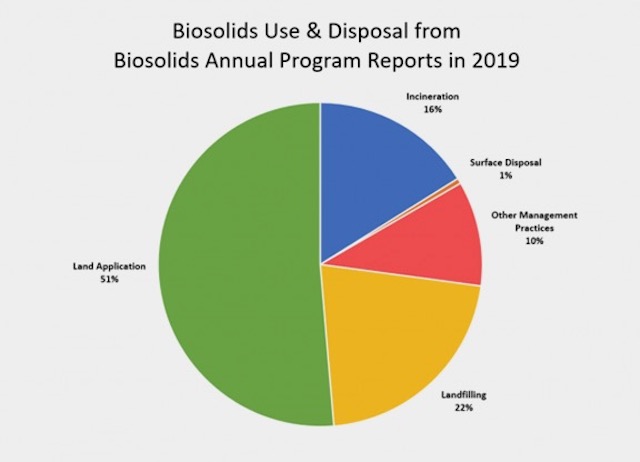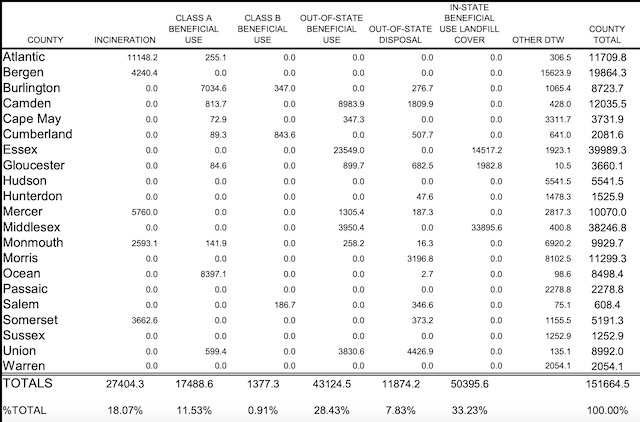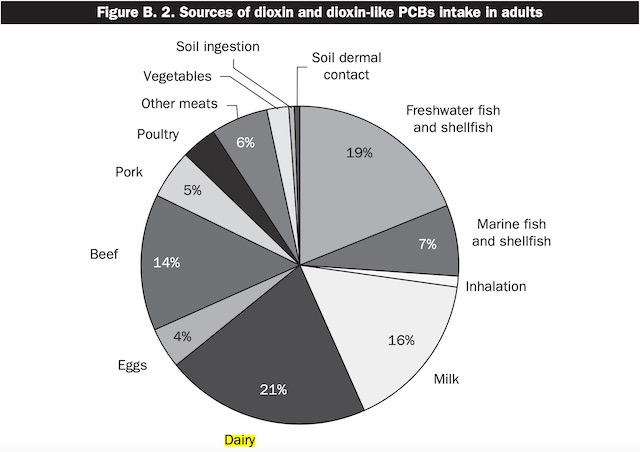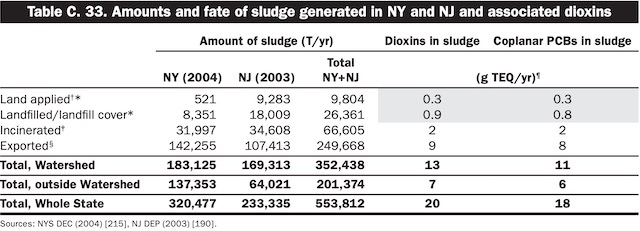DEP Permitted Land Application of Sewage Sludge & Wastewater “Beneficial Reuse” Sites Must Be Sampled
DEP Urged To Sample Soil, Groundwater, and Cows Milk & Dairy Products
PFAS Just One Example Of Hundreds Of Unregulated Chemicals
As of 2019, 51 percent of wastewater sludge nationwide was applied on agricultural lands, according to U.S. Environmental Protection Agency data. Source: US EPA
This situation reminds me of a controversy back in the late 1980′s, when DEP discovered dioxin and furans in Warren County cows milk:
“However, the routes from dioxins released to the environment to dioxins found in pigs, cows, chickens, fish, and human breast milk are neither simple nor direct.” (NY Academy of Sciences)
More alarming bad news out of the State of Maine, as farmers there learn that their soil, groundwater, and even dairy cow milk is contaminated with “forever chemicals” PFAS, see:
The suspected source of the chemical contamination is land application of sludge from sewage treatment plants.
NJ DEP has long had a “biosolids” reuse program that encouraged the widespread land application in NJ of sludge residuals as a fertilizer and soil amendment.
Here is the DEP Sludge Management Plan:
The 1978 amendments also included a provision (N.J.S.A. 13:1E-46) requiring that the Statewide Solid Waste Management Plan contain a sewage sludge management strategy, which shall provide for the maximum practical processing of all sewage sludge generated within the State, and for the processing or land disposal of any such sewage sludge generated.
Here is the most recent (2019) DEP “beneficial use” data:
It is very likely that PFAS chemicals were present but not sampled for and therefore contaminated the “biosolid” sludges that historically were land applied in NJ, primarily on farmland.
Here is the current DEP (voluntary) sludge sampling plan Guidance that recognizes that problem (but defers to the State of MICHIGAN):
Sampling for emerging contaminants create their own set of unique challenges. For example, Per- and Polyfluoroalkyl Substances (PFAS) are ubiquitous in our society. Therefore, there is a much greater chance of cross-contamination and extra precautions need to be taken when designing a sampling plan for PFAS. There are many available sampling guidance documents that have been developed to address sampling for PFAS in sludge. If a sampling plan needs to be addressed to specifically deal with PFAS, the Department would recommend consulting the Biosolids and Sludge PFAS Sampling Guidance that has been developed by the State of Michigan.
The NJ DEP also has long had a wastewater “beneficial reuse” program.
It is very likely that PFAS chemicals were present but not sampled for and therefore contaminated the wastewater that historically was land applied in NJ, again, primarily on farmland but even public places like parks.
Here is the DEP “Technical Manual for Reclaimed Water For Beneficial Reuse”.
I couldn’t find any PFAS sampling requirements, so it looks like there is not only an historic problem but a currently ongoing problem.
[Note: DEP has begun a narrow scope data collection program to examine PFAS sources in wastewater, but that effort is moving very slowly and it does not include historic and current land application of sludge, beneficial reuse of wastewater, farms, or agricultural products at contaminated farms, see:
DEP must now sample all previously DEP approved, permitted and known sludge land application and wastewater beneficial reuse sites for PFAS compounds.
That sampling needs to include soil, groundwater and cows milk. Here’s Maine’s experience and program:
What is the Maine DACF doing?
DACF has been investigating PFAS contamination on farms, with the focus initially on dairy farms. In 2016, milk at a dairy in Arundel, Maine was found to contain high levels of PFOS. The Maine CDC created an Action Threshold for PFOS in milk: 210 parts per trillion (ppt). Since then, DACF has conducted statewide retail milk samples three times. Where results appeared to indicate that source milk might contain high levels of PFOS, DACF worked with processors to successfully identify a contaminated farm in Fairfield, Maine. DEP water testing resulting from that discovery detected a second PFOS impacted dairy farm also in Fairfield. Learn more about DEP’s Fairfield investigation.
A lot more shit is about to hit the fan as farmers may lose PFAS contaminated water, farms, crops, animals, and/or cows milk.
This situation reminds me of a controversy back in the late 1980′s, when DEP discovered dioxin and furans in Warren County cows milk.
DEP covered that contamination up at the time, as it would have blocked the proposed Warren County garbage incinerator from being permitted and built.
Will DEP and the Department of Agriculture again suppress another toxic nightmare?
Fool me once….





Pingback: WolfeNotes.com » NJ Legislators To Consider A Bill To Ban And Label Certain Products Containing PFAS “Forever Chemicals”